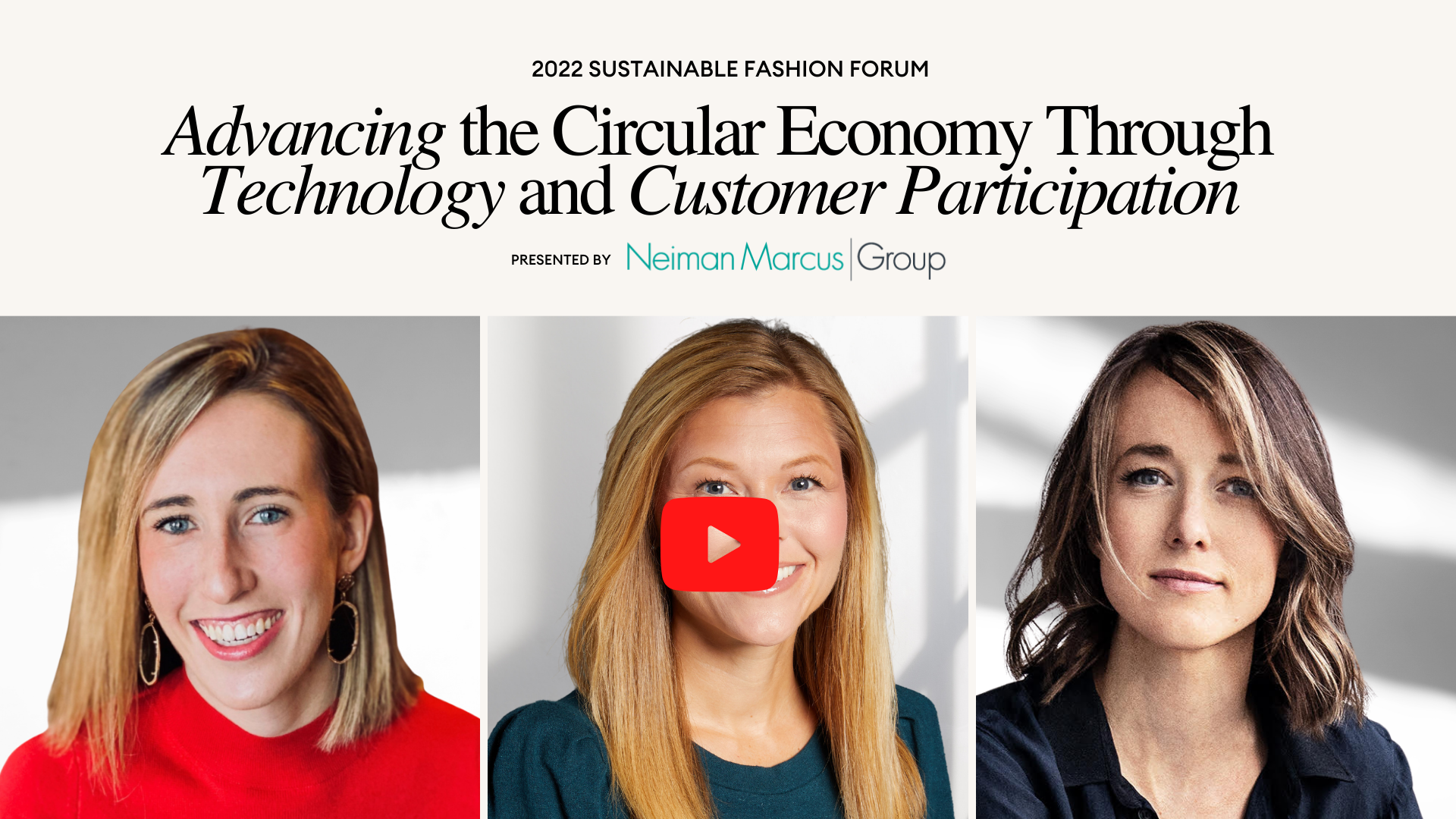Advancing the Circular Economy Through Technology and Customer Participation
This session first aired during the 2022 Sustainable Fashion Forum and was made accessible to the SFF community in partnership with Neiman Marcus Group.
For many multi-brand retailers, engaging in the sustainability conversation has entailed releasing shoppable "sustainability edits" of curated items with conscious-minded attributes and credentials. However, by occupying a unique position between brands and consumers, retailers can accelerate industry-wide change by encouraging the brands they carry to prioritize developing and manufacturing more sustainable products. They can also influence and promote mindful consumption and participation in circular services among their customers.
A first-mover and consistent investor in circular economy initiatives, Neiman Marcus Group is going beyond curated "sustainability" edits (though they offer those too) to support the industry's sustainable transformation.
At first glance, you might not associate Neiman Marcus Group with the circular economy; however, long before circularity became a buzzword, NMG group began taking its first steps towards championing circularity through in-store mending and alteration services. In 2015, Neiman Marcus partnered with The Real Real to expand in-store consignment, followed by a partnership with Rent the Runway the following year. In 2019, NMG bought a minority stake in Fashionphile, a leading second-hand store for luxury goods specializing in buying and selling used luxury handbags, jewelry, and accessories. Last year, NMG purchased Stylyze, a cloud-based SaaS platform that manages the lifecycle of clothing through the digital wardrobe.
As a luxury retailer, NMG knows that circularity is an obligation to their customer and the planet. “Because these are investment pieces, we have a different opportunity and accountability to provide the experiences to customers that facilitate participation in the luxury resale economy," said Kristin Miller, VP of product management, style & innovation at Neiman Marcus Group. “Our customers are excited to participate in the circular economy. They're looking for ways to participate, and it's our job to make it as frictionless as possible.”
Whether it's Fashionphile's authentication tech or Stylyze's product attribution data, technology is a crucial part of NMG's strategy to drive its technological transformation, advance the circular economy through customer participation, and spearhead circularity in luxury retail.
During the 2022 Sustainable Fashion Forum, Neiman Marcus Group powered a conversation with Miller, Natasha Franck, founder and CEO of Eon Group, and Ali Mize, director of ESG, belonging & corporate philanthropy, at Neiman Marcus Group, about a new technology that can improve authentication, provide transparency, boost consumer trust, and profitably scale circular business models by giving every garment its own digital identity.
“From the point of production to the point of sale, every product has a barcode that makes it possible to ID, manage, and sell billions of products worldwide. Right now, the moment a product is sold, we remove that ID because historically, brands haven't cared what happens to that product," explained Franck. “Now that we have rising new business models like resale, brands can't profitably manage the re-commerce of their products without that item-level identity. So, what we do at Eon is enable every single product to have what you could nickname a digital barcode for the circular economy. An embedded QR code or NFC chip that enables that product to tell you exactly what it is, who made it, its authenticity, where it came from, and where it should go next. This provides customers the information they need to participate in circular models, and it also provides the brands or retailers the ability to scale those models. Today, circular models are not profitable at scale. And if they're not profitable, they're not going to grow. So it's really important to have this underlying tech infrastructure.”
From the customer perspective, digital ID's allow shoppers to 'close the loop.' “In circularity, the customer is a supplier in the value chain,” continued Frank. “For resale to succeed, we need the customer to give us the product back. So we need to make it really easy for the user to engage in the re-commerce of their products. Today it's super inefficient. You're maybe rephotographing the product, typing in the information, or you're trying to figure out the original MSRP. It's not an optimized user experience to create the next life for your product. With a digital ID, customers could scan the product and request a return label or understand exactly where to drop it off to be recycled. You now have the information to be the best supplier and steward the circularity of that product.”
What are the challenges and opportunities of new technologies meant to enable fashion's transition from linear to circular, and how do we enable and empower customer participation?
Tune in and join the conversation. Click here to watch the full session on YouTube.









